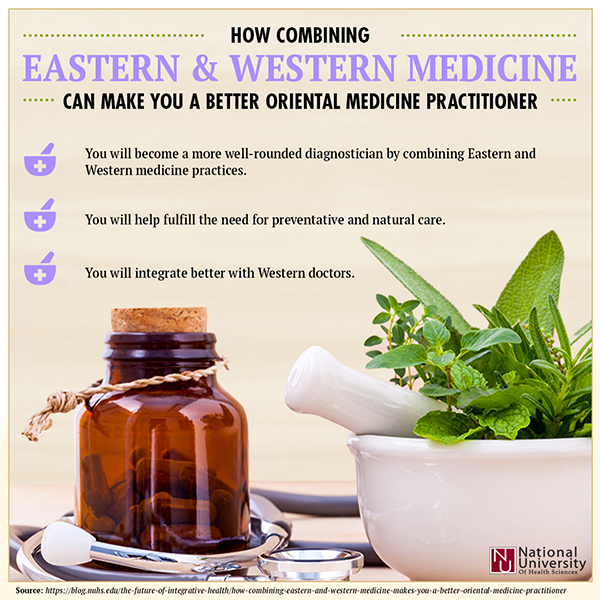Western and Eastern medicine both offer unique perspectives fundamental to healthcare today. You may be surprised to learn just how many Oriental medicine practitioners are already working in an integrative manner at health care facilities across the United States.
Many prestigious medical centers including Mayo Clinic, University of California San Francisco, and Duke University Medical Center currently offer Oriental medicine and other complementary and alternative medicine (CAM) treatments to their patients.
What is Western Medicine?
According to the National Cancer Institute (NCI) Western medicine can be defined as: “A system in which medical doctors and other health care professionals (such as nurses, pharmacists, and therapists) treat symptoms and diseases using drugs, radiation, or surgery.”
The history of Western medicine stretches back thousands of years—similar to Eastern medicine. The ancient Greeks were the first to look at the body from a human biological perspective. Hippocrates of Cos is often credited as the Father of Western Medicine because of his scientific descriptions of many diseases and their treatments.
This is sometimes referred to as allopathic medicine or conventional medicine. The primary focus of Western medicine is to identify and treat specific conditions to allow the patient to recover.
What is Eastern Medicine?
Eastern medicine, also known as Oriental medicine or traditional Chinese medicine, is the oldest codified system of medicine in the world. It refers to a range of medical practices that originated throughout Asia.
Here are five major branches of Oriental Medicine:
- Acupuncture
- Chinese herbal medicine
- Oriental nutrition and dietary therapy
- Tuina or oriental bodywork
- Tai chi and qi gong (mind-body-spirit practice)
The basic philosophy of Eastern medicine practitioners is to treat the whole person—encouraging a healthy body to prevent illness and speed recovery.
What is the Difference between Eastern and Western Medicine?
Western medicine tends to focus on diagnosing and treating a disease or illness based on a patient’s symptoms.
Eastern medicine considers both patient’s symptoms and an individualized diagnosis of a patient’s Qi (or chi). Based on various diagonstic procedures like checking the pulse and tongue, Traditional Chinese Medicine uses complex patterns of disharmony or imbalance within the body to determine a diagnosis usually as it relates to the whole person.
Diagnostic indicators are always viewed holistically to accurately assess physical and emotional imbalances of internal organs and restore a patient’s Qi, thereby encouraging health and healing.
Oriental medicine (i.e. Eastern Medicine) practitioners use natural forms of treatment that typically include herbs, acupuncture, nutrition, mind/body exercise (e.g., tai chi, yoga), or massage, whereas Western medicine practitioners often recommend pharmaceuticals, physical therapy, surgery, or psychological counseling, etc.
How Combining Eastern and Western Medicine Can Make You a Better Oriental Medicine Practitioner
Both types of care are very different, yet they each have a place in today’s current health care landscape. Many Eastern and Western medicine practitioners are finding ways that their treatments can complement each other.
National University’s Master of Science in Oriental Medicine (MSOM) and Master of Science in Acupuncture (MSAc) degree programs provide comprehensive education and training in Oriental medicine with a solid foundation in Western science, enabling you to become a superior alternative medicine practitioner.

Here are a few of the benefits of combining both types of health care:
1. You will become a more well-rounded diagnostician by combining Eastern and Western medicine practices.
For diagnosing disease, Western medicine practitioners will typically perform a physical exam, check blood pressure, look at a patient’s medical history, or use X-rays and other imaging equipment. While Eastern medicine practitioners will obtain diagnostic information through inquiry and external observation of symptoms, they will also test the pulse of both wrists and will look at the patient’s tongue, eyes, and overall color. They will use all their senses including, listening, touch, and smell to check for any signs of disharmony that a medical doctor might not otherwise notice.
In National University’s MSOM and MSAc programs, students learn to utilize both types of diagnostic tests, enabling them to determine more comprehensively what ailments patients are suffering from and, therefore, prescribe better treatment.
2. You’ll help fulfill the need for preventative and natural care.
Western medicine is reactive care that treats disease and other ailments as they arise. Eastern medicine, however, provides more preventative care that works to make sure body systems such as the immune and digestive systems are functioning at their best. Many times, these whole body systems, when not working properly or in disharmony, can be the underlying cause of diseases.
Today, many Americans are not making the best lifestyle choices concerning exercise and diet, and the preventative and whole body care that Eastern practitioners offer are more needed than ever. As an Eastern medicine practitioner working in the Western world, you will be able to help provide access to this much needed medical skill. In combination with Western medicine, you will be able to help patients have a healthier and more balanced life.
One key benefit of acupuncture, herbal treatments, and other alternative medicine practices is that they are non-invasive and cause few side effects. Before turning to prescription drugs or invasive surgery, Oriental medicine treatments are becoming more commonly used as a first-line approach.
In fact, the American College of Physicians recently updated its guidelines suggesting acupuncture and other CAM treatments as a first-line approach for low back pain, most likely due to concerns over growing opioid use. Unlike the morphine used most often in hospitals where patients are often on multiple medications, acupuncture does not run the risk of negative drug interactions nor does it have as many side effects. According to a 2016 study published in the American Journal of Emergency Medicine, acupuncture may even be more effective.
3. You will integrate better with Western doctors.
Eastern medicine treatments continue to make major strides in the academic research community, which includes major medical journals. And more Western hospitals and health facilities are likely to incorporate them in their healthcare services. This requires Oriental medicine practitioners to work in collaboration with other medical specialists.
Even if you choose not to work in a hospital or large medical clinic but prefer a private practice, it is likely that your patients might be seeing a medical doctor too. Having a solid foundation in Western science enables you to speak the same language as your MD, DO, and DC colleagues. You will also be better able to discuss diagnosis and treatment options with your patient’s doctors and understand the kind of care already received.
How Does NUHS Combine Eastern and Western Medicine to Prepare You to Succeed as an Oriental Medicine Practitioner?
NUHS’ curriculum is comprehensive.
Alongside courses in Eastern theories and techniques, National University’s Oriental medicine students learn fundamental biomedical science and modern medical diagnostics including coursework in radiology, pathology, physiology, microbiology, and public health.
NUHS students train with expert faculty.
Biomedical and basic sciences courses are taught by traditional medical faculty with Western medical degrees and other doctorate degrees in addition to courses by Oriental medicine experts from Eastern countries including China and South Korea.
The NUHS Whole Health Center offers intensive clinical training.
National University’s on-campus Whole Health Center clinic provides Oriental medicine students the experience to work alongside other health care students and practitioners from chiropractic medicine, naturopathic medicine, and massage therapy.
NUHS invests in state-of-the-art facilities.
Because National University has several health sciences programs, including Oriental medicine, acupuncture, chiropractic, and naturopathic medicine programs, we are constantly investing in state-of-the-art facilities needed to provide a solid foundation in basic sciences.
NUHS facilities feature:
- Top of the line gross anatomy lab where Oriental medicine and acupuncture students learn Western anatomy and Eastern meridian theory through hands-on dissection of a human cadaver.
- Life-size 3-D interactive table called The Anatomage Table offers students, faculty, and clinicians access to an advanced digital visualization system to augment anatomy education.
- Large and well-stocked herbal dispensary where students learn how to correctly choose and prepare effective herbal prescriptions, granular preparations, etc.
- State-of-the-art Biochemistry lab where students learn Western and clinical lab diagnosis using latest equipment and technology.
- A comprehensive Learning Resource Center, one of the largest medical libraries in the area that houses a huge collection of books, print and electronic journals, ebooks, bibliographic databases, and more.
At National University, you not only have access to the kind of education and training needed to become an acupuncture and/or oriental medicine practitioner but the knowledge that will prepare you for the exciting future that lies ahead in integrative health care.
{{cta(‘b7d331ad-fee8-45d2-9abd-f26523a7e68e’)}}




0 Comments